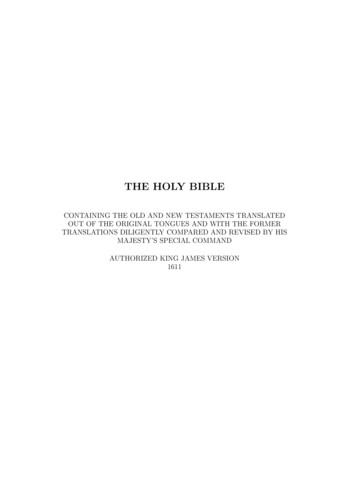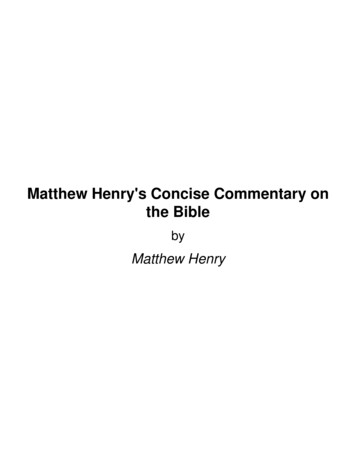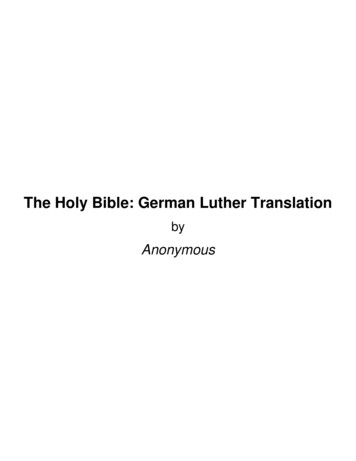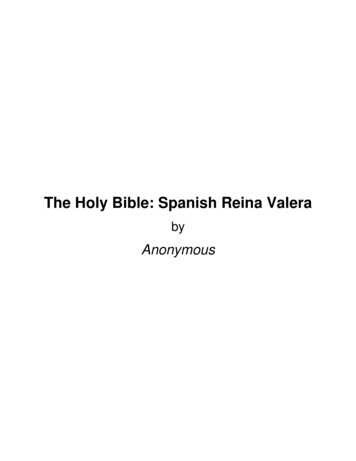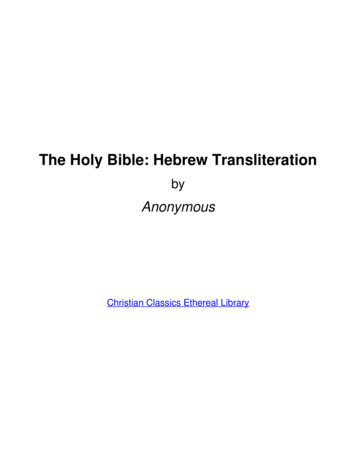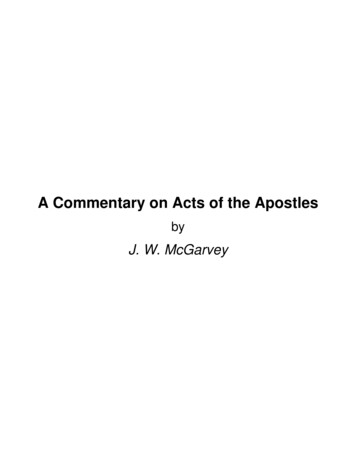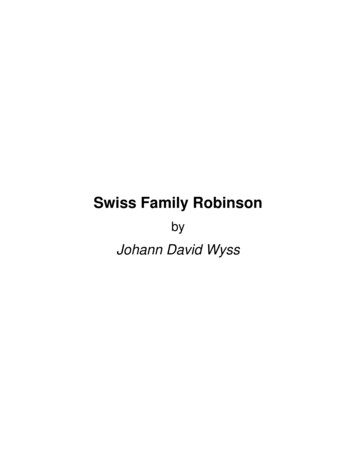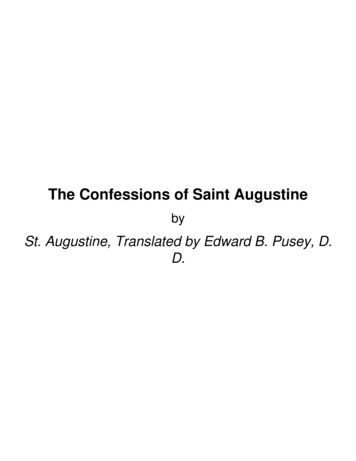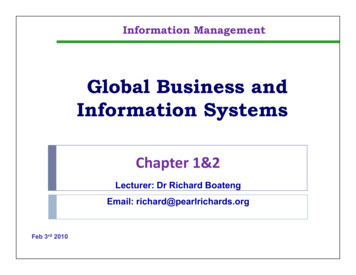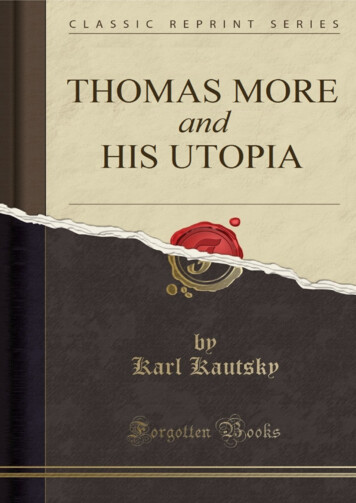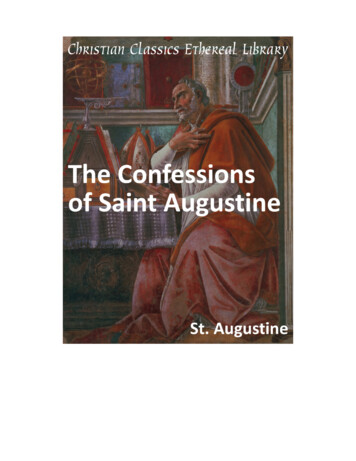
Transcription
The Confessions of Saint AugustineAuthor(s):Augustine, Saint, Bishop of Hippo (345-430)Publisher:Grand Rapids, MI: Christian Classics Ethereal LibraryDescription:Subjects:In his Confessions, Saint Augustine reflects upon his life inthe light of scripture and the presence of God. He beginswith his infancy, pondering the many sins of his life beforehis conversion, and he confesses not only his sins but evenmore the greatness of God. This work presents a wonderfulcontrast between the Holy God who created all things andwhom heaven and earth cannot contain, and a commonlysinful man who has joyfully received God's loving salvationand mercy.Many scholars consider Saint Augustine to be among thegreatest and most influential fathers of the early church. Andas you read his Confessions, you will find the confident humility that is common among those whom Jesus calls "greatin the kingdom of heaven." Augustine writes as a commonman, and so his words span time and tradition. May hisConfessions guide you to the One whom he confesses.ChristianityEarly Christian Literature. Fathers of the Church, etc.i
ContentsTitle Page1Contents2Book I25Chapter I26Chapter II27Chapter III28Chapter IV29Chapter V30Chapter VI31Chapter VII33Chapter VIII34Chapter IX35Chapter X36Chapter XI37Chapter XII38Chapter XIII39Chapter XIV41Chapter XV42Chapter XVI43Chapter XVII44Chapter XVIII45Book II47Chapter I48Chapter II49Chapter III50Chapter IV52ii
Chapter V53Chapter VI54Chapter VII56Chapter VIII57Chapter IX58Chapter X59Book III60Chapter I61Chapter II62Chapter III64Chapter IV65Chapter V66Chapter VI67Chapter VII69Chapter VIII71Chapter IX73Chapter X74Chapter XI75Chapter XII76Book IV77Chapter I78Chapter II79Chapter III80Chapter IV82Chapter V84Chapter VI85Chapter VII86Chapter VIII87Chapter IX88Chapter X89Chapter XI90Chapter XII91iii
Chapter XIII92Chapter XIV93Chapter XV95Chapter XVI97Book V99Chapter I100Chapter II101Chapter III102Chapter IV104Chapter V105Chapter VI106Chapter VII108Chapter VIII109Chapter IX111Chapter X112Chapter XI114Chapter XII115Chapter XIII116Chapter XIV117Book VI118Chapter I119Chapter II120Chapter III121Chapter IV123Chapter V124Chapter VI—126Chapter VII128Chapter VIII130Chapter IX131Chapter X132Chapter XI133Chapter XII135iv
Chapter XIII136Chapter XIV137Chapter XV138Chapter XVI139Book VII140Chapter I141Chapter II143Chapter III144Chapter IV145Chapter V146Chapter VI148Chapter VII150Chapter VIII151Chapter IX152Chapter X154Chapter XI155Chapter XII156Chapter XIII157Chapter XIV158Chapter XV159Chapter XVI160Chapter XVII161Chapter XVIII162Chapter XIX163Chapter XX164Chapter XXI165Book VIII166Chapter I167Chapter II169Chapter III171Chapter IV173Chapter V174v
Chapter VI176Chapter VII178Chapter VIII180Chapter IX181Chapter X182Chapter XI184Chapter XII186Book IX188Chapter I189Chapter II190Chapter III192Chapter IV194Chapter V197Chapter VI198Chapter VII199Chapter VIII200Chapter IX202Chapter X204Chapter XI206Chapter XII207Chapter XIII209Book X211Chapter I212Chapter II213Chapter III214Chapter IV215Chapter V216Chapter VI217Chapter VII219Chapter VIII220Chapter IX222Chapter X223vi
Chapter XI224Chapter XII225Chapter XIII226Chapter XIV227Chapter XV228Chapter XVI229Chapter XVII230Chapter XVIII231Chapter XIX232Chapter XX233Chapter XXi234Chapter XXII235Chapter XXIII236Chapter XXIV237Chapter XXV238Chapter XXVI239Chapter XXVII240Chapter XXVIII241Chapter XXIX242Chapter XXX243Chapter XXXI244Chapter XXXII246Chapter XXXIII247Chapter XXXIV248Chapter XXXV250Chapter XXXVI252Chapter XXXVII253Chapter XXXVIII255Chapter XXXIX256Chapter XL257Chapter XLI258Chapter XLII259vii
Chapter XLIIIBook XI260261Chapter I262Chapter II263Chapter III265Chapter IV266Chapter V267Chapter VI268Chapter VII269Chapter VIII270Chapter IX271Chapter X272Chapter XI273Chapter XII274Chapter XIII275Chapter XIV276Chapter XV277Chapter XVI279Chapter XVII280Chapter XVIII281Chapter XIX282Chapter XX283Chapter XXI284Chapter XXII285Chapter XXIII286Chapter XXIV287Chapter XXV288Chapter XXVI289Chapter XXVII290Chapter XXVIII292Chapter XXIX293Chapter XXX294viii
Chapter XXXIBook XII295296Chapter I297Chapter II298Chapter III299Chapter IV300Chapter V301Chapter VI302Chapter VII303Chapter VIII304Chapter IX305Chapter X306Chapter Xi307Chapter XII309Chapter XIII310Chapter XIV311Chapter XV312Chapter XVI314Chapter XVII315Chapter XVIII317Chapter XIX318Chapter XX319Chapter XXI320Chapter XXII321Chapter XXIII322Chapter XXIV323Chapter XXV324Chapter XXVI326Chapter XXVII327Chapter XXVIII328Chapter XXIX329Chapter XXX331ix
Chapter XXXI332Chapter XXXII333Book XIII334Chapter I335Chapter II336Chapter III337Chapter IV338Chapter V339Chapter VI340Chapter VII341Chapter VIII342Chapter IX343Chapter X344Chapter XI345Chapter XII346Chapter XIII347Chapter XIV348Chapter XV349Chapter XVI351Chapter XVII352Chapter XVIII353Chapter XIX355Chapter XX356Chapter XXI357Chapter XXII359Chapter XXIII360Chapter XXIV362Chapter XXV364Chapter XXVI365Chapter XXVII367Chapter XXVIII368Chapter XXIX369x
Chapter XXX370Chapter XXXI371Chapter XXXII372Chapter XXXIII373Chapter XXXIV374Chapter XXXV375Chapter XXXVI376Chapter XXXVII377Chapter XXXVIII378xi
This PDF file is from the Christian Classics Ethereal Library, www.ccel.org. The mission ofthe CCEL is to make classic Christian books available to the world. This book is available in PDF, HTML, ePub, and other formats. . Discuss this book online at http://www.ccel.org/node/3271.The CCEL makes CDs of classic Christian literature available around the world through theWeb and through CDs. We have distributed thousands of such CDs free in developingcountries. If you are in a developing country and would like to receive a free CD, pleasesend a request by email to cd-request@ccel.org.The Christian Classics Ethereal Library is a self supporting non-profit organization atCalvin College. If you wish to give of your time or money to support the CCEL, please visithttp://www.ccel.org/give.This PDF file is copyrighted by the Christian Classics Ethereal Library. It may be freelycopied for non-commercial purposes as long as it is not modified. All other rights are reserved. Written permission is required for commercial use.xii
Title PageThe Confessions of Saint Augustinetranslated by Edward B. Pusey, D.D.1
ContentsContentsBook I Chapter IHe proclaims the greatness of God, whom he desires to seek and invoke, being awakenedby him. Chapter IIThat the God whom we invoke is in us, and we in him. Chapter IIIEverywhere God wholly filleth all things, but neither heaven nor Earth containeth him. Chapter IVThe majesty of God is supreme, and his virtues inexplicable. Chapter VHe seeks rest in God, and pardon of his sins. Chapter VIHe describes his infancy, and lauds the protection and eternal providence of God. Chapter VIIHe shows by example that even infancy is prone to sin. Chapter VIIIThat when a boy he learned to speak, not by any set method, but from the acts and wordsof his parents. Chapter IXConcerning the hatred of learning, the love of play, and the fear of being whipped noticeable in boys: and of the folly of our elders and masters. Chapter XThrough a love of ball-playing and shows, he neglects his studies and the injunctions ofhis parents. Chapter XISiezed by disease, his mother being troubled, he earnestly demands baptism, which onrecovery is postponed—his father not as yet believing in Christ. Chapter XII2
ContentsBeing compelled, he gave his attention to learning; but fully acknowledges that this wasthe work of God. Chapter XIIIHe delighted in latin studies and the empty fables of the poets, but hated the elements ofliterature and the Greek language. Chapter XIVWhy he despised Greek literature, and easily learned Latin. Chapter XVHe entreats God, that whatever useful things he learned as a boy may be dedicated tohim. Chapter XVIHe disapproves of the mode of educating youth, and he points out why wickedness is attributed to the Gods by the poets. Chapter XVIIHe continues on the unhappy method of training youth in literary subjects. Chapter XVIIIMen desire to observe the rules of learning, but neglect the eternal rules of everlastingsafety.Book II Chapter IHe deplores the wickedness of his youth. Chapter IIStricken with exceeding grief, he remembers the dissolute passions in which, in his sixteenth year, he used to indulge. Chapter IIIConcerning his father, a freeman of Thagaste, the assister of his son's studies, and on theadmonitions of his mother on the preservation of chastity. Chapter IVHe commits theft with his companions, not urged on by poverty, but from a certain distasteof well-doing. Chapter V3
ContentsConcerning the motives to sin, which are not in the love of evil, but in the desire of obtaining the property of others. Chapter VIWhen he delighted in that theft, when all things which under the appearance of good inviteto vice are true and perfect in God alone. Chapter VIIHe gives thanks to God for the remission of his sins, and reminds everyone that the supreme God may have preserved us from greater sins. Chapter VIIIIn his theft he loved the company of his fellow-sinners. Chapter IXIt was a pleasure to him also to laugh when seriously deceiving others. Chapter XWith God there is true rest and life unchanging.Book III Chapter IDeluded by an insane love, he, though foul and dishonourable, desires to be thought elegant and urbane. Chapter IIIn public spectacles he is moved by an empty compassion. He is attacked by a troublesomespiritual disease. Chapter IIINot even when at church does he suppress his desires. In the School of Rhetoric he abhorsthe acts of the subverters. Chapter IVIn the nineteenth year of his age (His father having died two years before) he is led by the“Hortensius” of Cicero to “Philosophy,” to God, and a better mode of thinking. Chapter VHe rejects the sacred scriptures as too simple, and as not to be compared with the dignityof Tully. Chapter VI4
ContentsDeceived by his own fault, he falls into the errors of the Manichaeans, who gloried in thetrue knowledge of God and in a thorough examination of things. Chapter VIIHe attacks the doctrine of the Manichaeans concerning evil, God, and the righteousnessof the patriarchs. Chapter VIIIHe argues against the same as to the reason of offences. Chapter IXThat the judgment of God and men, as to human acts of violence, is different. Chapter XHe reproves the triflings of the Manichaeans as to the fruits of the Earth. Chapter XIHe refers to the tears, and the memorable dream concerning her son, granted by God tohis mother. Chapter XIIThe excellent answer of the Bishop when referred to by his mother as to the conversionof her son.Book IV Chapter IConcerning that most unhappy time in which he, being deceived, deceived others; andconcerning the mockers of his confession. Chapter IIHe teaches rhetoric, the only thing he loved, and scorns the soothsayer, who promisedhim victory. Chapter IIINot even the most experienced men could persuade him of the vanity of astrology, towhich he was devoted. Chapter IVSorely distressed by weeping at the death of his friend, he provides consolation for himself. Chapter VWhy weeping is pleasant to the wretched.5
Contents Chapter VIHis friend being snatched away by death, he imagines that he remains only as half. Chapter VIITroubled by restlessness and grief, he leaves his country a second time for Carthage. Chapter VIIIThat his grief ceased by time, and the consolation of friends. Chapter IXThat the love of a human being, however constant in loving and returning love, perishes;while he who loves God never loses a friend Chapter XThat all things exist that they may perish, and that we are not safe unless God watchesover us. Chapter XIThat portions of the world are not to be loved; but that God, their author, is immutable,and his Word eternal. Chapter XIILove is not condemned, but love in God, in whom there is rest through Jesus Christ, isto be preferred. Chapter XIIILove originates from grace, and beauty enticing us. Chapter XIVConcerning the books which he wrote “On the Fair and Fit,” dedicated to Hierius. Chapter XVWhile writing, being blinded by corporeal images, he failed to recognise the spiritualnature of God. Chapter XVIHe very easily understood the liberal arts and the categories of Aristotle, but without truefruit.Book V Chapter IThat it becomes the soul to praise God, and to confess unto him.6
Contents Chapter IIOn the vanity of those who wished to escape the omnipotent God. Chapter IIIHeaving heard Faustus, the most learned Bishop of the Manichaeans, he discerns thatGod, the author both of things animate and inanimate, chiefly has care for the humble. Chapter IVThat the knowledge of terrestrial and celestial things does not give happiness, but theknowledge of God only. Chapter VOf Manichaeus pertinaciously teaching false doctrines, and proudly arrogating to himselfthe Holy Spirit. Chapter VIFaustus was indeed an elegant speaker, but knew nothing of the liberal sciences. Chapter VIIClearly seeing the fallacies of the Manichaeans, he retires from them, being remarkablyaided by God. Chapter VIIIHe sets out for Rome, his mother in vain lamenting it. Chapter IXBeing attacked by fever, he is in great danger Chapter XWhen he had left the Manichaeans, he retained his depraved opinions concerning sinand the origin of the Saviour. Chapter XIHelpidius disputed well against the Manichaeans as to the authenticity of the New Testament. Chapter XIIProfessing rhetoric at Rome, he discovers the fraud of his scholars. Chapter XIIIHe is sent to Milan, that he, about to teach rhetoric, may be known by Ambrose. Chapter XIV7
ContentsHaving heard the Bishop, he perceives the force of the catholic faith, yet doubts, after themanner of the modern academics.Book VI Chapter IHis mother having followed him to Milan, declares that she will not die before her sonshall have embraced the Catholic faith. Chapter IIShe, on the prohibition of Ambrose, abstains from honouring the memory of the Martyrs. Chapter IIIAs Ambrose was occupied with business and study, Augustin could seldom consult himconcerning the Holy Scriptures. Chapter IVHe recognises the falsity of his own opinions, and commits to memory the saying ofAmbrose. Chapter VFaith is the basis of human life; man cannot discover that truth which holy scripture hasdisclosed. Chapter VIOn the source and cause of true joy,—the example of the joyous beggar being adduced. Chapter VIIHe leads to reformation his friend Alypius, seized with madness for the Circensian games. Chapter VIIIThe same when at Rome, being led by others into the Amphitheatre, is delighted withthe Gladitorial games. Chapter IXInnocent Alypius, being apprehended as a thief, is set at liberty by the cleverness of anarchitecht. Chapter XThe wonderful integrity of Alypius in judgment. the lasting friendship of Nebridius withAugustin. Chapter XI8
ContentsBeing troubled by his grievous errors, he meditates entering on a new life. Chapter XIIDiscussion with Alypius concerning a life of celibacy. Chapter XIIIBeing urged by his mother to take a wife, he sought a maiden that was pleasing unto him. Chapter XIVThe design of establishing a common household with his friends is speedily hindered. Chapter XVHe dismisses one mistress, and chooses another. Chapter XVIThe fear of death and judgment called him, believing in the immortality of the soul, backfrom his wickedness, him who aforetime believed in the opinions of Epicurus.Book VII Chapter IHe regarded not god indeed under the form of a human body, but as a corporeal substancediffused through space. Chapter IIThe disputation of Nebridius against the Manichaeans, on the question “Whether Godbe corruptible or incorruptible.” Chapter IIIThat the cause of evil is the free judgment of the will. Chapter IVThat God is not corruptible, who, if he were, would not be God at all. Chapter VQuestions concerning the origin of evil in regard to God, who, since he is the chief god,cannot be the cause of evil. Chapter VIHe refutes the Divinations of the astrologers, deduced from the constellations. Chapter VIIHe is severely exercised as to the origin of evil.9
Contents Chapter VIIIBy God's assistance he by degrees arrives at the truth. Chapter IXHe compares the doctrine of the Platonists concerning the Logos with the much moreexcellent doctrine of Christianity. Chapter XDivine things are the more clearly manifested to him who withdraws into the recesses ofhis heart. Chapter XIThat creatures are mutable and God alone immutable. Chapter XIIWhatever things the good God has created are very good. Chapter XIIIIt is meet to praise the creator for the good things which are made in Heaven and Earth. Chapter XIVBeing displeased with some part of God's creation, he conceives of two original substances. Chapter XVWhatever is, owes its being to God. Chapter XVIEvil arises not from a substance, but from the perversion of the will. Chapter XVIIAbove his changeable mind, he discovers the unchangeable author of truth. Chapter XVIIIJesus Christ, the mediator, is the only way of safety. Chapter XIXHe does not yet fully understand the saying of John, that “the word was made flesh.” Chapter XXHe Rejoices that he proceeded from Plato to the Holy Scriptures, and not the reverse. Chapter XXIWhat he found in the sacred books which are not to be found in Plato.10
ContentsBook VIII Chapter IHe, now given to divine things, and yet entangled by the lusts of love, consults simplicanusin reference to the renewing of his mind. Chapter IIThe pious old man rejoices that he read plato and the scriptures, and tells him of therhetorician victorinus having been converted to the faith through the reading of the sacredbooks Chapter IIIThat God and the Angels rejoice more on the return of one sinner than of many justpersons. Chapter IVHe shows by the example of victorinus that there is more joy In the conversion of nobles. Chapter VOf the causes which alienate us from God. Chapter VIPontitainus’ account of Antony, the founder of monachism, and of some who imitatedhim. Chapter VIIHe deplores his wretchedness, that having been born thirty-two years, he had not yetfound out the truth. Chapter VIIIThe conversation with Alypius being ended, he retires to the garden whither his friendfollows him. Chapter IXThat the mind commandeth the mind, but it willeth not entirely. Chapter XHe refutes the opinion of the Manichaeans as to two kinds of minds,—one good and theother evil. Chapter XIIn what manner the spirit struggled with the flesh, that it might be freed from the bondageof vanity.11
Contents Chapter XIIHaving prayed to God, he pours forth a shower of tears, and, admonished by a voice, heopens the book and reads the words in Rom. XIII. 13; by which, being changed in hiswhole soul, he discloses the divine favour to his friend and his mother.Book IX Chapter IHe praises God, the author of safety, and Jesus Christ, the redeemer, acknowledging hisown wickedness. Chapter IIAs his lungs were affected, he meditates withdrawing himself from public favour. Chapter IIIHe retires to the villa of his friend Verecundus, who was not yet a Christian, and refersto his conversion and death, as well as that of Nebridius. Chapter IVIn the country he gives his attention to literature, and explains the Fourth Psalm in connection with the happy conversion of Alypius. He is troubled with toothache. Chapter Vat the recommendation of Ambrose, he reads the prophecies of Isaiah, but does not understand them. Chapter VIHe is baptized at Milan with Alypius and his son Adeodatus. the book “De Magistro.” Chapter VIIOf the Church hymns instituted at Milan; of the Ambrosian Persecution raised by Justina;and of the discovery of the bodies of two martyrs. Chapter VIIIOf the conversion of Evodius, and the death of his mother when returning with him toAfrica; and whose education he tenderly relates. Chapter IXHe describes the praiseworthy habits of his mother; her kindness towards her husbandand her sons. Chapter X12
ContentsA conversation he had with his mother concerning the kindom of heaven. Chapter XIHis mother, attacked by fever, dies at Ostia. Chapter XIIHow he mourned his dead mother. Chapter XIIIHe entreats God for her sins, and admonishes his readers to remember her piously.Book X Chapter IIn God alone is the hope and joy of man. Chapter IIThat all things are manifest to God. That confession unto him is not made by the wordsof the flesh, but of the soul, and the cry of reflection. Chapter IIIHe who confesseth rightly unto God best knoweth himself. Chapter IVThat in his confessions he may do good, he considers others. Chapter VThat man knoweth not himself wholly. Chapter VIThe love of God, in his nature superior to all creatures, is acquired by the knowledge ofthe senses and the exercise of reason. Chapter VIIThat God is to be found neither from the powers of the body nor of the soul. Chapter VIIIOf the nature and the amazing power of memory. Chapter IXNot only things, but also literature and images, are taken from the memory, and arebrought forth by the act of remembering. Chapter X13
ContentsLiterature is not introduced to the memory through the senses, but is brought forth fromits more secret places. Chapter XIWhat it is to learn and to think. Chapter XIIon the recollection of things mathematical. Chapter XIIIMemory retains all things. Chapter XIVConcerning the manner in which joy and sadness may be brought back to the mind andmemory. Chapter XVIn memory there are also images of things which are absent. Chapter XVIThe privation of memory is forgetfulness. Chapter XVIIGod cannot be attained unto by the power of memory, which beasts and birds possess. Chapter XVIIIA thing when lost could not be found unless it were retained in the memory. Chapter XIXWhat it is to remember. Chapter XXWe should not seek for God and the Happy life unless we had known it. Chapter XXIHow a happy life may be retained in the memory. Chapter XXIIA happy life is to rejoice in God, and for God. Chapter XXIIIAll wish to rejoice in the truth. Chapter XXIV14
ContentsHe who finds truth, finds God. Chapter XXVHe is glad that God dwells in his memory. Chapter XXVIGod everywhere answers those who take counsel of him. Chapter XXVIIHe grieves that he was so long without God. Chapter XXVIIIOn the misery of human life. Chapter XXIXAll hope is in the mercy of God. Chapter XXXOf the perverse images of dreams, which he wishes to have taken away. Chapter XXXIAbout to speak of the temptations of the lust of the flesh, he first complains of the lust ofeating and drinking. Chapter XXXIIOf the charms of perfumes which are more easily overcome. Chapter XXXIIIHe Overcame the pleasures of the ear, although in the church he frequently delighted inthe song, not in the thing sung. Chapter XXXIVOf the very dangerous allurements of the eyes; on account of beauty of form, God, thecreator, is to be praised. Chapter XXXVAnother kind of temptation is curiosity, which is stimulated by the lust of the eyes. Chapter XXXVIA third kind is “pride,” which is pleasing to man, not to God. Chapter XXXVIIHe is forcibly goaded on by the love of praise.15
Contents Chapter XXXVIIIVain-glory is the highest danger. Chapter XXXIXOf the vice of those who, while pleasing themselves, displease God. Chapter XLThe only safe resting-place for the soul is to be found in God. Chapter XLIHaving conquered his triple desire, he arrives at salvation. Chapter XLIIIn what manner many sought the mediator. Chapter XLIIIThat Jesus Christ, at the same time God and man, is the true and most efficacious mediator.Book XI Chapter IBy confession he desires to stimulate towards God his own love and that of his readers. Chapter IIHe begs of God that through the Holy Scriptures he may be led to truth. Chapter IIIHe begins from the creation of the world—not understanding the Hebrew text. Chapter IVHeaven and Earth cry out that they have been created by God. Chapter VGod created the world not from any certain matter, but In his own word. Chapter VIHe did not, however, create it by sounding and passing word. Chapter VIIBy his co-eternal word he speaks, and all things are done. Chapter VIII16
ContentsThat word itself is the beginning of all things, in the which we are instructed as to evangelical truth. Chapter IXWisdom and the beginning. Chapter XThe rashness of those who inquire what God did before he created Heaven and Earth. Chapter XIThey who ask this have not as yet known the eternity of God, which is exempt from therelation of time. Chapter XIIWhat God did before the creation of the world. Chapter XIIIBefore the times created by God, times were not. Chapter XIVNeither time past nor future, but the present only, really is. Chapter XVThere is only a moment of present time. Chapter XVITime can only be perceived or measured while it is passing. Chapter XVIINevertheless there is time past and future. Chapter XVIIIPast and future times cannot be thought of but as present. Chapter XIXWe are ignorant in what manner God teaches future things. Chapter XXIn what manner time may properly be designated. Chapter XXIHow time may be measured. Chapter XXII17
ContentsHe prays God that he would explain this most entangled enigma. Chapter XXIIIThat time is a certain extension. Chapter XXIVThat time is not a motion of a body which we measure by time. Chapter XXVHe calls on God to enlighten his mind. Chapter XXVIWe measure longer events by shorter in time. Chapter XXVIITimes are measured in proportion as they pass by. Chapter XXVIIITime in the human mind, which expects, considers, and remembers. Chapter XXIXThat human life is a distraction, but that through the mercy of God he was intent on theprize of his heavenly calling. Chapter XXXAgain he refutes the empty question, “What did God before the creation of the world?” Chapter XXXIHow the Knowledge of God differs from that of Man.Book XII Chapter IThe Discovery of Truth is Difficult, but God Has promised that he who seeks shall find. Chapter IIOf the double heaven,—the visible, and the heaven of heavens. Chapter IIIOf the Darkness upon the deep, and of the invisible and formless earth. Chapter IVFrom the Formlessness of matter, the beautiful world has arisen.18
Contents Chapter VWhat may have been the form of matter. Chapter VIHe confesses that at one time he himself thought erroneously of matter. Chapter VIIOut of nothing God made heaven and earth. Chapter VIIIHeaven and Earth were made “In the beginning;” afterwards the world, during six days,from shapeless matter. Chapter IXThat the Heaven of Heavens was an Intellectual creature, but that the Earth was invisibleand formless before the days that it was made. Chapter XHe begs of God that he may live in the true light, and may be instructed as to the mysteriesof the sacred books. Chapter XIWhat may be discovered to him by God. Chapter XIIFrom the formless Earth God created another Heaven and a visible and formed Earth. Chapter XIIIOf the intellectual Heaven and formless Earth, out of which, on another day, the firmamentwas formed. Chapter XIVOf the depth of the Sacred Scripture, and its enemies. Chapter XVHe argues against adversaries concerning the Heaven of Heavens. Chapter XVIHe wishes to have no intercourse with those who deny divine truth. Chapter XVIIHe mentions five explanations of the words of Genesis I. Chapter XVIII19
ContentsWhat error is harmless in sacred scripture. Chapter XIXHe enumerates the things concerning which all agree. Chapter XXOf the words, “in the beginning,” Variously understood. Chapter XXIOf the explanation of the words, “The Earth was invisible.” Chapter XXIIHe discusses whether matter was from eternity, or was made by God. Chapter XXIIITwo kinds of disagreements in the books to be explained. Chapter XXIVOut of the many true things, it is not asserted confidently that Moses understood this orthat. Chapter XXVIt behoves interpreters, when disagreeing concerning obscure places, to regard God theauthor of truth, and the rule of charity. Chapter XXVIWhat he might have asked of God had he been enjoined to write the Book of Genesis. Chapter XXVIIThe style of speaking in the Book of Genesis is simple and clear. Chapter XXVIIIThe words, “In the beginning,” and, “The Heaven and the Earth,” are differently understood. Chapter XXIXConcerning the opinion of those who explain it “At first he made.” Chapter XXXIn the great diversity of opinions, it becomes all to unite charity and divine truth. Chapter XXXIMoses is supposed to have perceived whatever of truth can be discovered in his words.20
Contents Chapter XXXIIFirst, the sense of the writer is to be discovered, then that is to be brought out which divinetruth intended.Book XIII Chapter IHe calls upon God, and proposes to himself to worship him. Chapter IIAll creatures subsist from the plenitude of divine goodnss. Chapter IIIGenesis I. 3,—of “Light,”—He understands as it is seen in the spiritual creature. Chapter IVAll things have been created by the grace of God, and are not of him as standing need ofcreated things. Chapter VHe recognises the Trinity in the first two verses of Genesis. Chapter VIWhy the Holy Ghost should have been mentioned after the mention of Heaven and Earth. Chapter VIIThat the Holy Spirit brings us to God. Chapter VIIIThat nothing whatever, short of God, can yield to the rational creature a happy rest. Chapter IXWhy the Holy Spirit was only “Borne over” the waters. Chapter XThat nothing arose save by the gift of God. Chapter XIThat the symbols of the Trinity in man, to be, to know, and to will, are never thoroughlyexamined. Chapter XII21
ContentsAllegorical explanation of Gen
The Confessions of Saint Augustine Author(s): Augustine, Saint, Bishop of Hippo (345-430) Publisher: Grand Rapids, MI: Christian Classics Ethereal Library Description: In his Confessions, Saint Augustine reflects upon his life in the light of scripture and the presence of God. He begins with his infancy, pondering the many sins of his life before
